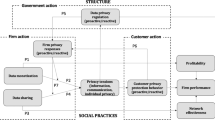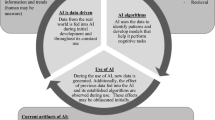Abstract
As business environments become more complex and reliant on information systems, the decisions made by managers affect a growing number of stakeholders. This paper proposes a framework based on the application of normative theories in business ethics to facilitate the evaluation of IS related ethical dilemmas and arrive at fair and consistent decisions. The framework is applied in the context of an information privacy dilemma to demonstrate the decision making process. The ethical dilemma is analyzed using each one of the three normative theories—the stockholder theory, stakeholder theory, and social contract theory. The challenges associated with the application of these theories are also discussed.
Similar content being viewed by others
References
Bishop, J.D. (2000). A framework for discussing normative theories of business ethics. Business Ethics Quarterly, 563–591.
Bowie, N. F., & Freeman, R. E. (1992). Ethics and agency theory: An introduction. In N. E. Bowie & R. B. Freeman (Eds.), Ethics and agency theory. Oxford: Oxford University Press.
Bucciarelli, L. L. (2008). Ethics and engineering education. European Journal of Engineering Education, 33(2), 141–149.
Burk, D. L. (2005). Legal and technical standards in digital rights management technology. Fordham Law Review, 74(2), 537–574.
Cavanagh, G. F., Moberg, D. J., & Velasquez, M. (1995). Making business ethics practical. Business Ethics Quarterly, 5(3), 399–418.
Council of Europe. (2010). Convention for the Protection of Human Rights and Fundamental Freedoms amended as on June 1 2010. Available at: http://conventions.coe.int/treaty/en/treaties/html/005.htm.
Donaldson, T. J. (1982). Corporations and morality. Englewood Cliffs, NJ: Prentice-Hall.
Donaldson, T. S. (1989). The ethics of international business. New York: Oxford University Press.
Donaldson, T., & Dunfee, T. W. (1994). Toward a unified conception of business ethics: Integrative social contracts theory. The Academy of Management Review, 19(2), 252–284.
Donaldson, T., & Dunfee, T. W. (1999). The social contract for business. Ties that bind: A social contracts approach to business ethics. Boston, MA: Harvard Business Press.
Donaldson, T., & Preston, L. K. (1995). The stakeholder theory of the corporation: Concepts, evidence, and implications. Academy of Management Review, 65–91.
European Parliament and Council. (1995). Directive 95/46/EC of 24 October 1995 on the protection of individuals with regard to the processing of personal data on the free movement of such data. Available at: http://ec.europa.eu/justice/policies/privacy/docs/95-46-ce/dir1995-46_part1_en.pdf.
European Union. (2000). Charter of fundamental rights of the European union, 7 December 2000. Official Journal of the European Communities, 18 December 2000 (2000/C 364/01). Available at: http://www.unhcr.org/refworld/docid/3ae6b3b70.html.
Evan, W. M., & Freeman, R. E. (1988). A stakeholder theory of the modern corporation: Kantian capitalism. In T. L. Beauchamp & N. E. Bowie (Eds.), Ethical theory and business (3rd ed., pp. 97–106). Englewood Cliffs, NJ: Prentice-Ball.
Friedman, M. (1962). Capitalism and freedom. Chicago: University of Chicago Press.
Friedman, M. (2007). The social responsibility of business is to increase its profits. Corporate Ethics and Corporate Governance, 173–178.
Hasnas, J. (1998). The normative theories of business ethics: A guide for the perplexed. Business Ethics Quarterly, 8(1), 19–42.
Hinduja, S. (2007). Neutralization theory and online software piracy: An empirical analysis. Ethics and Information Technology, 9(3), 187–204.
Kant, I. (1785/1959). Foundations of the metaphysics of morals (trans: Beck, L. W.). New York: Liberal Arts Press.
Konstantakis, N. I., Palaigeorgioub, G. E., Siozosa, P. D., & Tsoukalasa, I. A. (2010). What do computer science students think about software piracy? Behaviour & Information Technology, 29(3), 277–285.
Kultgen, J. (1985). Donaldson’s social contract for business. Business and Professional Ethics Journal, 5, 28–39.
Laczniak, G. R., & Murphy, P. E. (2008). Distributive justice: Pressing questions, emerging directions, and the promise of Rawlsian analysis. Journal of Macromarketing, 28(1), 5–11.
Laudon, K. C., & Laudon, J. P. (2009). Management information systems: Managing the digital firm. Englewood Cliffs, NJ: Prentice Hall.
Litzky, B. E., & Oz, E. (2008). Ethical issues in information technology: Does education make a difference? International Journal of Information and Communication Technology Education, 4(2), 67–83.
Loch, K. D., & Conger, S. (1996). Evaluating ethical decision making and computer use. Communications of’ the ACM, 39(7), 74–83.
Mason, R. O., Mason, F. M., & Culnan, M. J. (1995). Ethics of information management. Thousand Oaks, CA: Sage.
Matchett, N. J. (2008). Ethics across the Curriculum. New Directions for Higher Education, 142, 14.
Mill, J. S. (1965). In J. B. Schneewind (Ed.), Mill’s ethical writings. New York: Collier Books.
Orlikowski, W., & Iacono, S. (2001). Research commentary: Desperately Seeking the ‘IT’ in IT research–a call to theorizing the IT artifact. Information Systems Research, 12(2), 121–134.
Quinn, D. P., & Jones, T. M. (1995). An agent morality view of’ business policy. Academy of Management Review, 20(1), 22–42.
Rawls, J. (1971). A theory of justice. Cambridge, MA: Harvard University Press.
Reynolds, G. (2009). Ethics in information technology. Stamford, USA: Course Technology.
Smith, H. J. (1994). Managing privacy: Information technology and corporate America. Chapel Hill, USA: University of North Carolina Press.
Stahl, B. C. (2008). The ethical nature of critical research in information systems. Information Systems Journal, 18(2), 137–163.
Stevens, B. (2008). Corporate ethical codes: Effective instruments for influencing behavior. Journal of Business Ethics, 78(4), 601–609.
van den Hoven, J., & Weckert, J. (2008). Information technology and moral philosophy. Cambridge: Cambridge University Press.
Velasquez, M. G. (2006). Business ethics: Concepts and cases. Upper Saddle River, NJ: Pearson Prentice Hall.
Verbeek, P. P. (2009). The moral relevance of technological artifacts. In P. Sollie & M. Duwell (Eds.), Evaluating new technologies: Methodological problems for the ethical assessment of technology developments (pp. 63–79). Dordrecht: Springer.
Wright, D. (2010). A framework for the ethical impact assessment of information technology. Ethics and Information Technology. doi:10.1007/s10676-010-9242-6.
Acknowledgments
I thank Dr. Deepak Datta at the University of Texas at Arlington, USA for his assistance with editing the manuscript. I also extend my thanks to the reviewers, and specially reviewer #3 for the detailed comments that greatly helped in improving the clarity of the article.
Author information
Authors and Affiliations
Corresponding author
Rights and permissions
About this article
Cite this article
Bose, U. An ethical framework in information systems decision making using normative theories of business ethics. Ethics Inf Technol 14, 17–26 (2012). https://doi.org/10.1007/s10676-011-9283-5
Published:
Issue Date:
DOI: https://doi.org/10.1007/s10676-011-9283-5




